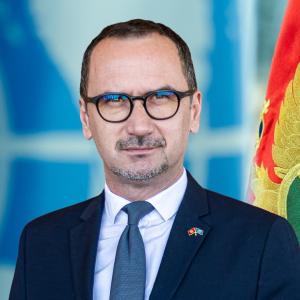Montenegro must improve support for victims and potential victims of trafficking, says UN expert
08 November 2019
- “I am concerned about the low number of victims being identified and supported,” said Giammarinaro, Special Rapporteur on trafficking in persons, especially women and children, presenting a statement at the end of her mission.

PODGORICA / GENEVA (8 November 2019) – Montenegro must substantially improve its assistance for victims and potential victims of trafficking, said UN Special Rapporteur Maria Grazia Giammarinaro at the end of an eight-day visit to the country.
Many migrants using the so-called Balkan route were vulnerable to trafficking and exploitation, she said, urging Montenegro to cooperate with experienced NGOs to increase the number of people being identified as victims and supported.
“I am concerned about the low number of victims being identified and supported,” said Giammarinaro, Special Rapporteur on trafficking in persons, especially women and children, presenting a statement at the end of her mission.
“There are weaknesses to be addressed as a matter of priority regarding assistance and support for victims. The whole accommodation system should be prepared to operate on a regular basis for a higher number of potential victims. As things stand, the NGOs running shelters could not survive without the support of external and/or private donors.
“An effective assistance system, including specialised shelters for trafficking victims, needs to operate on a permanent basis and be adequately funded. This is also key to improving and increasing identification rates, as victims are more likely to come forward if assistance, especially adequate accommodation, is readily available.”
Giammarinaro also expressed concern about the low number of criminal proceedings, but noted that the Government of Montenegro had recently changed its operational structure, and said a team created in August to lead operational activities on criminal proceedings had already shown promising results.
The Special Rapporteur welcomed the adoption of new standard operating procedures to identify victims, developed in collaboration with the International Organization for Migration, as well as guidance on the implementation of the non-punishment of victims, developed in cooperation with OSCE, and the compensation fund for victims of violence, which however has not yet entered into force.
“Under the standard operating procedures, an innovative model will be established, in which decisions about victim support will be based on an assessment made by a multidisciplinary team, and not only by the police,” she said.
“This should imply that not only victims identified during criminal proceedings, but also potential victims identified on personal and social grounds, will receive assistance. Such a model, accompanied by a strong victim support system, can lead the country to achieve significant results. However, such innovative measures need to be implemented, and this will ultimately be the real challenge.”
The replacement of the National Coordination with an anti/trafficking unit within the Ministry of Interior could give the impression that trafficking was being made less of a priority, Giammarinaro called on the Government to show renewed political will to tackle trafficking.
“The new Government structures must now prove that preventing and countering trafficking, even more than in the past, is a strong commitment, and will produce concrete results in the near future,” she said.
She highlighted that Montenegro was a country of transit and destination for migrants, with internal trafficking also present, especially affecting Roma communities. Trafficking is particularly present in the coastal part of the country and primarily during summer, when people are probably trafficked for sexual or labour exploitation, domestic servitude and begging.
During her visit, Giammarinaro met representatives of Government agencies, as well as UN officials and members of civil society organisations. She also visited shelters.
She will present a detailed report of her findings and recommendations to the UN Human Rights Council in June 2020.
Ms Maria Grazia Giammarinaro (Italy) was appointed as Special Rapporteur on trafficking in persons, especially women and children, by the UN Human Rights Council in June 2014. She has been a Judge since 1991 and currently serves as a Judge at the Civil Court of Rome. She was the Special Representative and Coordinator for Combating Trafficking in Human Beings of the OSCE, and served in the European Commission’s Directorate-General for Justice, Freedom and Security in Brussels, where she was responsible for combating human trafficking and sexual exploitation of children. Ms Giammarinaro drafted the EU Directive on preventing and combating trafficking in human beings and protecting its victims.
The Special Rapporteurs are part of what is known as the Special Procedures of the Human Rights Council. Special Procedures, the largest body of independent experts in the UN Human Rights system, is the general name of the Council’s independent fact-finding and monitoring mechanisms that address either specific country situations or thematic issues in all parts of the world. Special Procedures experts work on a voluntary basis; they are not UN staff and do not receive a salary for their work. They are independent from any government or organisation and serve in their individual capacity.
UN Human Rights country page - Montenegro
For more information and media requests, please contact:
Ms Clara Pascual de Vargas (+41 22 917 8214 / cpascualdevargas@ohchr.org)
For media inquiries related to other UN independent experts, please contact:
Mr. Jeremy Laurence, UN Human Rights – Media Unit (+41 22 917 9383 / jlaurence@ohchr.org)
Follow news about the UN’s independent human rights experts on Twitter @UN_SPExperts.
Concerned about the world we live in? Then STAND UP for someone’s rights today. #Standup4humanrights and visit the web page at http://www.standup4humanrights.org




